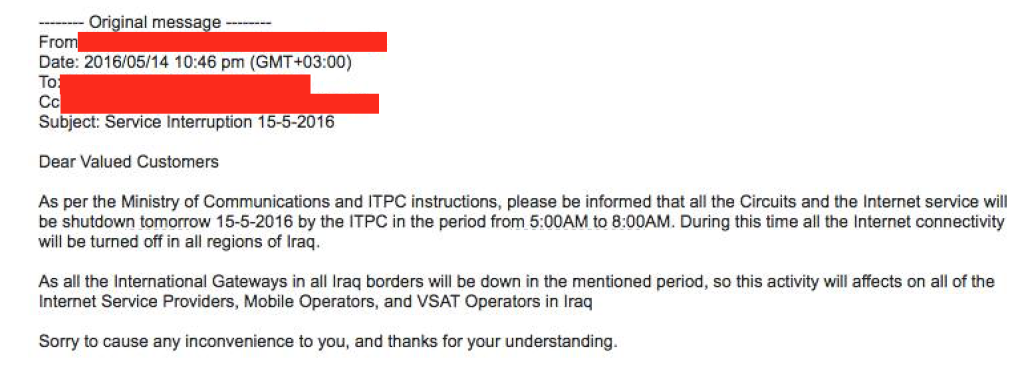Feature image: Leaked email from an Iraqi ISP alerting recipients of an impending Internet shutdown on May 16, 2016.
Iraq is shutting down its Internet again, but this time not for security reasons. A leaked email that originated from an Iraqi Internet service provider (ISP) and was shared with SMEX confirms that on May 16, 2016, the Internet will be shutdown for three hours, from 5 a.m. to 8 a.m., “in all regions of Iraq.” The email was also posted on the Tech4Peace Facebook page.
Internet traffic analysts Dyn Research and Akamai also confirmed that there have been traffic anamolies in Iraq on May 14, 15, and 16:
3rd 3hr blackout in 3 days as #Iraq continues attempts to block cheating on exams. More outages expected.. pic.twitter.com/culrbXPH9m
— Dyn Research (@DynResearch) May 16, 2016
Multi-hour #Internet disruptions in #Iraq occurring for a third straight day, reportedly to prevent exam cheating. pic.twitter.com/Ulv8fwKmvX
— StateOfTheInternet (@akamai_soti) May 16, 2016
An Iraqi blogger with the Iraqi Network for Social Media, Muhannad Hameed, explained to SMEX over WhatsApp that the Internet shutdown coincides with Iraqi official exams for secondary and high schools and was implemented to prevent cheating. A similar shutdown was also implemented in 2015. In the wake of that shutdown, free expression and human rights organizations sent a letter protesting the move to the Iraqi minister of communication, but to date have received no response.
Government-ordered Internet shutdowns are at best a disproportionate response to undesirable use of the internet. At worst, they are a gross violation of human and civil rights and pose real risks to people trying to communicate for a wide variety of reasons. What’s more, there is no proof that Internet shutdowns help governments achieve their goals, whether its to improve security or to prevent cheating.
According to Access, a global digital rights advocacy organization that has recently launched the #KeepItOn campaign, an internet shutdown is “an intentional disruption of internet or electronic communications, rendering them inaccessible or effectively unusable, for a specific population or within a location, often to exert control over the flow of information.” In 2015, Access documented shutdowns in 15 countries, including in Algeria, Iraq, and Yemen. According to SMEX sources, Lebanon has also experienced shutdowns in and around Tripoli, but we have not yet been able to document these interruptions of service.
We join our Iraqi friends and request from the Iraqi government not to shut down the Internet anymore.


